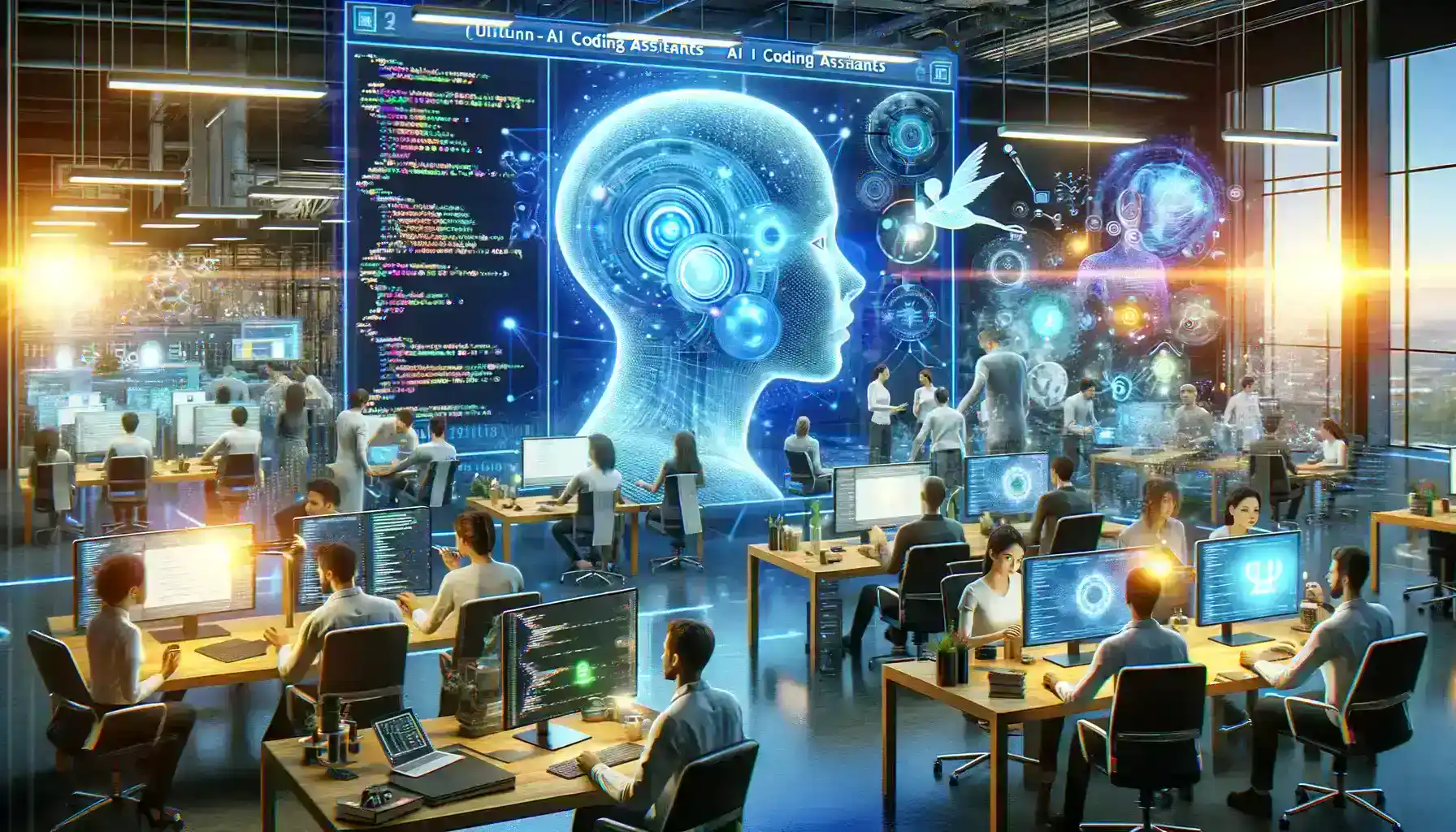Table of Contents
In 2024, the intersection of artificial intelligence (AI) and DevOps practices has given rise to a profound transformation in software development and deployment. AI coding assistants, which leverage advanced machine learning algorithms and natural language processing capabilities, have become integral tools for developers and DevOps teams. While these AI-powered assistants promise to enhance productivity and streamline processes, they also present a set of challenges that make them a double-edged sword for the DevOps industry.
On one side of the blade, AI coding assistants have significantly accelerated software development workflows. They offer real-time code suggestions, auto-completion, and bug detection, reducing the time required to write, test, and deploy code. This boost in efficiency has enabled teams to meet tighter release schedules and deliver more feature-rich applications to market faster than ever before.
Furthermore, AI coding assistants are instrumental in ensuring code quality and security. They can identify vulnerabilities, enforce coding standards, and assist in code reviews, helping to reduce the risk of security breaches and software defects. This not only improves the end-user experience but also minimizes post-deployment maintenance.
The Rise of AI Coding Assistants

In recent years, AI coding assistants have experienced an exponential surge in popularity within the DevOps landscape. These intelligent tools have not only gained widespread adoption but have also evolved to become indispensable assets to development and operations teams.
What sets AI coding assistants apart is their remarkable technological prowess. They are equipped with potent machine-learning algorithms and possess advanced natural language processing capabilities. This amalgamation of technologies empowers them with a multifaceted skill set that includes:
Understanding and Generating Code Snippets: AI coding assistants demonstrate an exceptional ability to comprehend complex code structures. They can analyze existing codebases, identify patterns, and generate code snippets that align seamlessly with the project’s requirements. This proficiency expedites coding tasks, enabling developers to work more efficiently.
Automating Repetitive Tasks: Repetitive and time-consuming tasks, such as code formatting or routine debugging, can be automated with remarkable precision by these AI assistants. This automation liberates developers from the drudgery of repetitive work, allowing them to focus on more creative and strategic aspects of software development.
Real-Time Suggestions: One of the standout features of AI coding assistants is their capacity to provide real-time suggestions. As developers write code, these assistants offer suggestions for improvements, identify potential errors, and propose code optimizations. This real-time feedback enhances the quality of code and reduces the likelihood of introducing bugs.
Facilitating Collaboration: AI coding assistants bridge development and operations teams. By streamlining and automating various tasks, they promote seamless collaboration. This collaborative approach results in faster development cycles, smoother deployments, and improved overall efficiency.
The versatility and adaptability of AI coding assistants have made them indispensable in the ever-evolving world of DevOps. As they continue to refine their capabilities and learn from their interactions, these assistants promise to be transformative tools for DevOps practitioners, enabling them to tackle complex challenges with greater efficiency and precision.
The Blessings: How AI Coding Assistants Benefit DevOps
One cannot overstate the advantages that AI coding assistants bring to the DevOps arena. First and foremost is the acceleration of development and deployment processes. These tools have the capacity to generate code segments swiftly, detect and rectify bugs, and automate the often arduous testing procedures. This translates into a substantial reduction in software delivery timelines.
Moreover, AI coding assistants are adept at error reduction. They possess an innate capability to ferret out and rectify errors, thereby diminishing the likelihood of bugs or security vulnerabilities infiltrating production code. This contributes significantly to enhancing software quality.
Furthermore, the collaborative dimension of DevOps benefits significantly from these assistants. By automating routine tasks, they facilitate seamless cooperation between development and operations teams. This, in turn, frees up valuable time and resources to focus on the more strategic aspects of their work.
Last but not least, AI coding assistants are continuous learners. They continuously glean insights from their interactions, honing their coding suggestions and adapting to the ever-evolving technological landscape. This adaptability ensures that they remain valuable assets to DevOps teams as they grow and evolve.
The Challenges: The Dark Side of AI Coding Assistants
However, as with any powerful tool, AI coding assistants come with their own set of challenges and potential pitfalls. Perhaps the most significant concern is the risk of overreliance on automation. There is a danger that DevOps teams may become overly dependent on these tools, entrusting them with critical decisions without fully comprehending the intricacies of the underlying code.

Security is another looming concern. While AI is capable of identifying vulnerabilities, it can also inadvertently introduce security risks if not configured and monitored diligently. Malicious actors could exploit these AI-generated vulnerabilities to compromise systems and data.
Code quality is also a subject of debate. AI-generated code may prioritize speed and efficiency over long-term maintainability. This can lead to situations where code becomes convoluted, making it challenging to debug or enhance in the future.
Additionally, ethical dilemmas have emerged on the horizon. AI coding assistants may inadvertently perpetuate biases present in existing codebases. This raises important questions about fairness and discrimination in the software development process.
Striking a Balance
The path to harnessing the full potential of AI coding assistants while mitigating their challenges lies in striking a delicate balance. Education and training are paramount, ensuring that DevOps teams comprehend the capabilities and limitations of AI. Developers should view AI as a tool to augment their work, not as a replacement.
Robust code review processes that involve both humans and AI can help safeguard code quality and security. Ethical considerations must also be at the forefront, with developers actively working to identify and rectify biases in AI models, promoting fairness and inclusivity in their software.
Moreover, stringent cybersecurity measures should be implemented to protect AI coding assistants from malicious manipulation, ensuring the integrity of the development and deployment process.
The Future of AI Coding Assistants in DevOps

AI coding assistants have firmly established their presence in the DevOps domain, and their trajectory suggests a future of continuous growth and innovation. As we look ahead, it becomes evident that these intelligent tools are here to stay, and their role in DevOps will not only persist but expand significantly in the years to come.
One of the driving forces behind the evolution of AI coding assistants is the ongoing refinement of AI models. As technology advances, AI models are becoming increasingly sophisticated and capable. They are better equipped to understand complex code structures, provide more accurate suggestions, and adapt to the specific needs of different development projects. This continual improvement in AI capabilities translates into enhanced productivity and efficiency for DevOps teams.
Moreover, ethical concerns surrounding AI coding assistants are being actively addressed. DevOps practitioners, along with the broader tech community, are committed to ensuring that these tools are developed and used responsibly. Efforts are underway to identify and rectify biases in AI models, promote transparency in AI decision-making, and establish ethical guidelines for their deployment. As ethical considerations gain prominence, AI coding assistants are poised to become more reliable and fairer in their interactions with developers and operations teams.
Looking to the future, the impact of AI coding assistants on the software development and deployment landscape cannot be overstated. These tools have the potential to revolutionize the way software is created, tested, and deployed. They will continue to drive agility and efficiency in DevOps practices, enabling teams to deliver high-quality software at a faster pace.
However, as AI coding assistants become increasingly integral to DevOps workflows, practitioners must maintain a vigilant stance. While these tools offer tremendous benefits, they also pose certain risks, including the potential for overreliance and security vulnerabilities. DevOps professionals must strike a delicate balance between harnessing AI’s potential and safeguarding against its pitfalls.
In 2024 and beyond, success in DevOps will hinge on the ability to navigate this balance effectively. Embracing AI as a powerful ally is essential, but it must be done with a watchful eye on the potential challenges and ethical considerations. As DevOps practitioners continue to adapt to the evolving landscape, they will find that AI coding assistants are invaluable assets, propelling them toward greater innovation and efficiency in software development and deployment.
Conclusion
AI coding assistants in 2024 are indeed a double-edged sword for DevOps. They bring unprecedented speed, efficiency, and security to software development and deployment, but they also pose challenges related to overreliance, privacy, and skill development. Striking the right balance between harnessing the power of AI and maintaining the core competencies of DevOps professionals will be a critical task for organizations in the years to come.
Moreover, as AI coding assistants handle sensitive code and data, organizations must prioritize data security and privacy. Implementing robust security measures, stringent access controls, and ethical guidelines for AI usage will be paramount to safeguarding valuable intellectual property and sensitive information.
In the coming years, the DevOps community must also collaborate to establish industry standards and best practices for AI coding assistants. Sharing knowledge and experiences can help mitigate common challenges and ensure that AI integration aligns with DevOps’ overarching goals of delivering high-quality software rapidly and reliably.